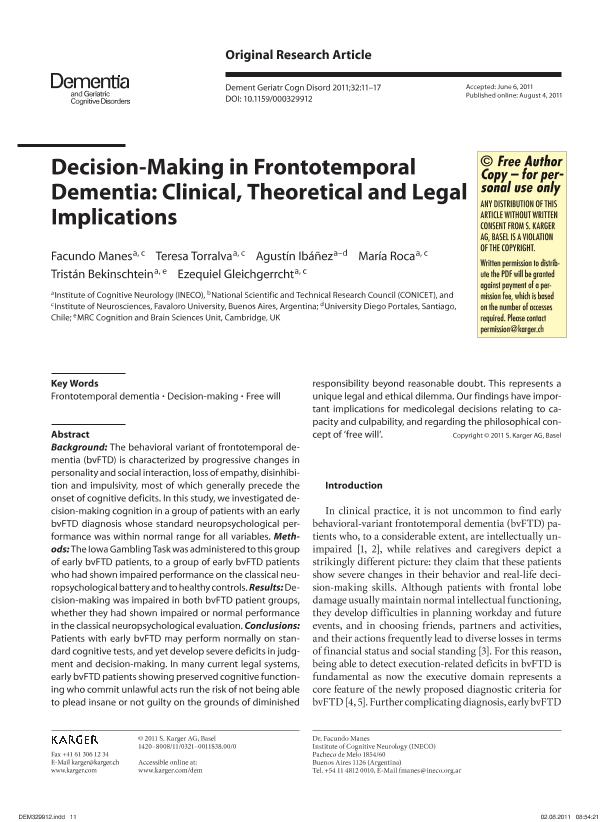Mostrar el registro sencillo del ítem
dc.contributor.author
Manes, Facundo Francisco

dc.contributor.author
Torralva, Teresa
dc.contributor.author
Ibañez, Agustin Mariano

dc.contributor.author
Roca, María
dc.contributor.author
Bekinschtein, Tristán Andrés

dc.contributor.author
Gleichgerrcht, Ezequiel

dc.date.available
2023-04-11T11:01:14Z
dc.date.issued
2011-08
dc.identifier.citation
Manes, Facundo Francisco; Torralva, Teresa; Ibañez, Agustin Mariano; Roca, María; Bekinschtein, Tristán Andrés; et al.; Decision-making in frontotemporal dementia: Clinical, theoretical and legal implications; Karger; Dimentia And Geriatric Congnitive Disorders; 32; 1; 8-2011; 11-17
dc.identifier.issn
1420-8008
dc.identifier.uri
http://hdl.handle.net/11336/193136
dc.description.abstract
Background: The behavioral variant of frontotemporal dementia (bvFTD) is characterized by progressive changes in personality and social interaction, loss of empathy, disinhibition and impulsivity, most of which generally precede the onset of cognitive deficits. In this study, we investigated decision-making cognition in a group of patients with an early bvFTD diagnosis whose standard neuropsychological performance was within normal range for all variables. Methods: The Iowa Gambling Task was administered to this group of early bvFTD patients, to a group of early bvFTD patients who had shown impaired performance on the classical neuropsychological battery and to healthy controls. Results: Decision-making was impaired in both bvFTD patient groups, whether they had shown impaired or normal performance in the classical neuropsychological evaluation. Conclusions: Patients with early bvFTD may perform normally on standard cognitive tests, and yet develop severe deficits in judgment and decision-making. In many current legal systems, early bvFTD patients showing preserved cognitive functioning who commit unlawful acts run the risk of not being able to plead insane or not guilty on the grounds of diminished responsibility beyond reasonable doubt. This represents a unique legal and ethical dilemma. Our findings have important implications for medicolegal decisions relating to capacity and culpability, and regarding the philosophical concept of 'free will'.
dc.format
application/pdf
dc.language.iso
eng
dc.publisher
Karger

dc.rights
info:eu-repo/semantics/openAccess
dc.rights.uri
https://creativecommons.org/licenses/by-nc-sa/2.5/ar/
dc.subject
DECISION-MAKING
dc.subject
FREE WILL
dc.subject
FRONTOTEMPORAL DEMENTIA
dc.subject.classification
Neurología Clínica

dc.subject.classification
Medicina Clínica

dc.subject.classification
CIENCIAS MÉDICAS Y DE LA SALUD

dc.title
Decision-making in frontotemporal dementia: Clinical, theoretical and legal implications
dc.type
info:eu-repo/semantics/article
dc.type
info:ar-repo/semantics/artículo
dc.type
info:eu-repo/semantics/publishedVersion
dc.date.updated
2023-04-05T15:30:56Z
dc.journal.volume
32
dc.journal.number
1
dc.journal.pagination
11-17
dc.journal.pais
Suiza

dc.journal.ciudad
Basel
dc.description.fil
Fil: Manes, Facundo Francisco. Instituto de Neurología Cognitiva; Argentina. Consejo Nacional de Investigaciones Científicas y Técnicas; Argentina. Universidad Favaloro; Argentina
dc.description.fil
Fil: Torralva, Teresa. Instituto de Neurología Cognitiva; Argentina. Universidad Favaloro; Argentina
dc.description.fil
Fil: Ibañez, Agustin Mariano. Consejo Nacional de Investigaciones Científicas y Técnicas; Argentina. Universidad Diego Portales; Chile. Instituto de Neurología Cognitiva; Argentina. Universidad Favaloro; Argentina
dc.description.fil
Fil: Roca, María. Instituto de Neurología Cognitiva; Argentina. Universidad Favaloro; Argentina
dc.description.fil
Fil: Bekinschtein, Tristán Andrés. Instituto de Neurología Cognitiva; Argentina. Consejo Nacional de Investigaciones Científicas y Técnicas; Argentina
dc.description.fil
Fil: Gleichgerrcht, Ezequiel. Instituto de Neurología Cognitiva; Argentina. Universidad Favaloro; Argentina
dc.journal.title
Dimentia And Geriatric Congnitive Disorders

dc.relation.alternativeid
info:eu-repo/semantics/altIdentifier/url/https://www.karger.com/Article/Abstract/329912
dc.relation.alternativeid
info:eu-repo/semantics/altIdentifier/doi/http://dx.doi.org/10.1159/000329912
Archivos asociados
